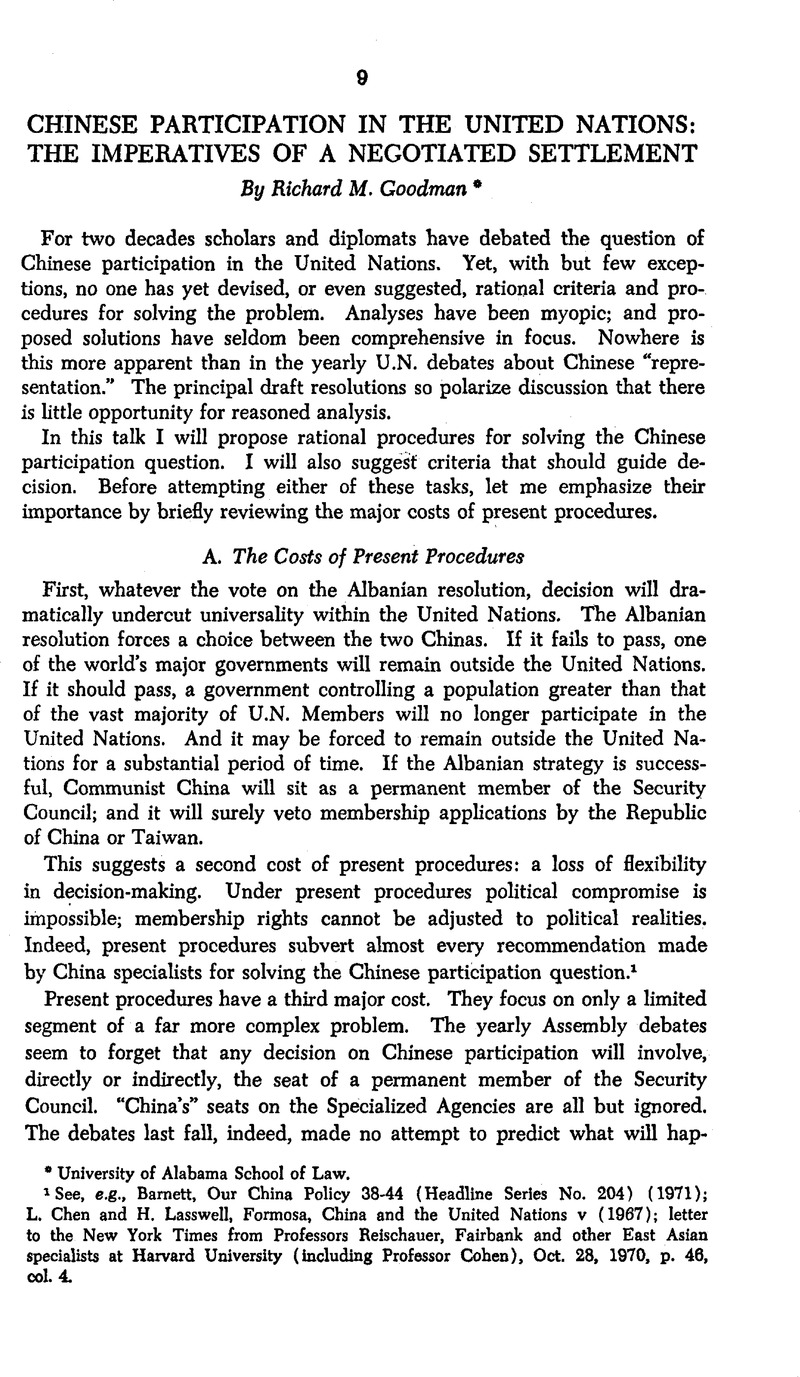No CrossRef data available.
Article contents
Chinese Participation in the United Nations: The Imperatives of a Negotiated Settlement
Published online by Cambridge University Press: 28 March 2017
Abstract

- Type
- First Session
- Information
- Copyright
- Copyright © American Society of International Law 1971
References
1 See, e.g., Barnett, Our China Policy 38-44 (Headline Series No. 204) (1971); L. Chen and H. Lasswell, Formosa, China and the United Nations v (1967); letter to the New York Times from Professors Reischauer, Fairbank and other East Asian specialists at Harvard University (including Professor Cohen), Oct. 28, 1970, p. 46, col. 4.
2 25 U.N. GAOR, 1902nd meeting ff. (1970).
3 For a more complete analysis, see McDougal, and Goodman, , “Chinese Participation in the United Nations: The Legal Imperatives of a Negotiated Solution,” 60 A.J.I.L. 671 (1966)Google Scholar.
4 The resolution and related materials are conveniently collected in Sohn, L., Cases on United Nations Law at 104 ff. (2d ed., 1967)Google Scholar.
5 See McDougal and Goodman, note 3 above, at 688-692.
6 Bloomfield, , “China, the United States, and the United Nations,” 20 Int. Organization 653, 663-664 (1966)CrossRefGoogle Scholar.
7 See McDougal and Goodman, note 3 above at 714-717. See also “The Chinese People Firmly Support the Arab People’s Struggle Against Aggression” (Foreign Languages Press, ed.)Google Scholar; New China News Agency (“NCNA”) release, July 30, 1970; “U. S. Imperialism—Backer and Arch Criminal Behind Armed Aggression Against Guinea,” Peking Review (No. 49) 11, Dec. 4, 1970; “Down With Revived Japanese Militarism,” Peking Review (No. 36) 4, 6, Sept. 4, 1970 (opposing any contribution of troops by Japan to United Nations forces); “U.N. Tentacles Extended to Cambodia,” Peking Review (No. 16) 25, April 17, 1970.
8 Major recent statements of Communist Chinese ideology include Mao Tse-tung, “People of the World, Unite and Defeat the U. S. Aggressors and their Running Dogs,” Peking Review (special issue), May 23, 1970; editorial departments of the People’s Daily, Red Flag, and Liberation Army Daily, “Long Live the Victory of the Dictatorship of the Proletariat,” NCNA release, March 17, 1971. The principles of Communist Chinese foreign policy were stated thus by Lin Piao in his Report to the Ninth National Congress of the Communist Chinese Party: “to develop relations of friendship, mutual assistance and cooperation with socialist countries on the principle of proletarian internationalism; to support and assist the revolutionary struggles of all the oppressed people and nations; to strive for peaceful coexistence with countries having different social systems ... ; and to oppose the imperialist policies of aggression and war.” Piao, Lin, “On China’s Relations with Foreign Countries,” translated in 2 Chinese Law & Gov’t. 51, 58-59 (1969).CrossRefGoogle Scholar
9 See Lowenthal, , “Russia and China: Controlled Conflict,” 49 Foreign Affairs 507 (1971)CrossRefGoogle Scholar.
10 See the perceptive account by O. Young, The Intermediaries ( 1967).
11 “U.N. Anniversary Session Becomes Platform for Denouncing U. S. Imperialism,” Peking Review (No. 45) 21-22, Nov. 6, 1970.
12 “. . . U. S. imperialism has little support for its unjust cause and is extremely isolated and in disgrace even in the United Nations,” in “U. S. Imperialism—Backer and Arch Criminal Behind Armed Aggression Against Guinea,” Peking Review (No. 49) 11, Dec. 4, 1970.
13 Compare Chen Yi, Press Conference of Sept. 20, 1965, in Peking Review (No. 41) 7, 12 (Oct. 8, 1965), with “UNGA Again Debates Chinese Representation,” NCNA release, Nov. 21, 1968; and “U.N. General Assembly Debate on Restoration of China’s Legitimate Rights in the U.N.: U. S. Imperialism’s Policy of Hostility Towards China Suffers Serious Defeat,” Peking Review (No. 48) 20, Nov. 27, 1970.




